We use cookies to ensure that we give you the best experience on our website. If you continue to use this site we will assume that you are happy with it
How Do I Know If I Passed My Background Check? Do This Now
 Written by Background Check Repair
Written by Background Check Repair
Background Checks | May 16, 2024
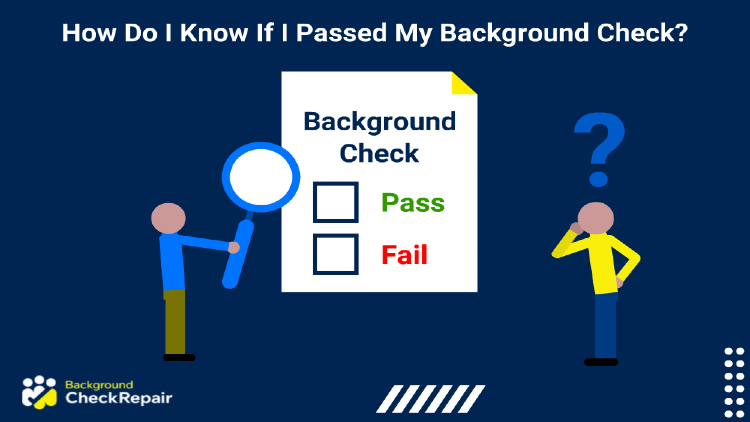
Table of Contents
“How do I know if I passed my background check?” is a common question people ask in different circumstances surrounding criminal checks for employment, firearm purchases, rental agreement signing, adoption, home mortgage application, and even a potential promotion at work.
It can be nerve-wracking and even excruciating in some cases to wait for a background check to come back either “passed,” or “failed,” and the next chapter of your life seems to hang in the balance while you’re waiting. Even for those who don’t expect anything noteworthy to show up on a criminal inquiry, background checks can be stressful. They don’t have to be, though.
The first thing you should do immediately is conduct a background check on yourself right now. Because of how background check laws work, you can conduct one quickly on yourself without permission and verify that any potential information is correct. It is not uncommon for invalid information to show up and if you haven’t conducted a check on yourself, you could be wrongly discriminated against by faulty records.
That way, you’ll know exactly what to expect once you’ve submitted information for testing or given permission to an agency, recruiter, staffing company, or employer to run a background check on you. The more you know upfront, the less you need to worry.
Background Checks: How Do I Know If I Pass or Fail?
For starters, background checks for employment, adoption, renting, or any other reason are all under the jurisdiction of the Federal Trade Commission (FTC). Certain states have additional protections for people who submit to background checks for employment, and other causes.
Once data is culled from numerous data repositories and it’s used to make a decision about you, you have rights about how that data is used. You can determine if you get a passing grade or fail based on some simple information.
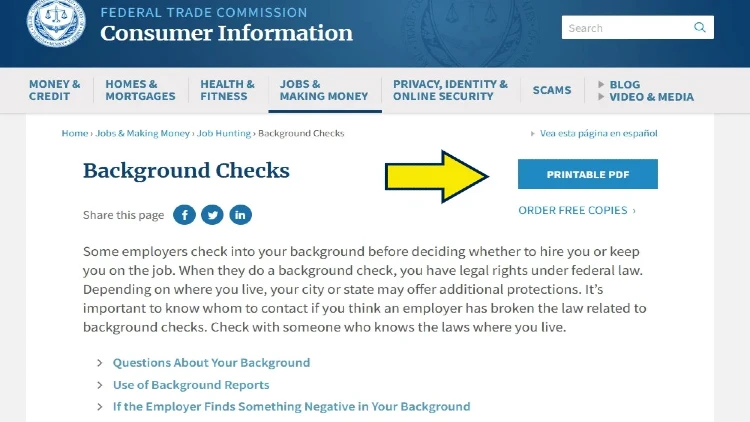
You can learn quickly what information is included in a background check by performing one on yourself first. That will arm you with the information you need to know before an agency sees it, so you won’t have to wonder “How do I know if I passed my background check?”
Employee Background Check
You have a right to know what’s in your own files, and also to request that a potential employer or another party requesting the background screening keeps your data confidential. Once you submit a resume and fill out forms for a position, your check (if you’re a potential candidate or employee) will require your consent.
Failed Check
If you suspect that you did not pass a background investigation after an employment offer, or if an employer doesn’t hire you, and they use data from a background check to make that decision, they are legally bound to disclose what data they used to disqualify you from a job. The same is true if you are refused credit, denied the ability to rent an apartment, accept a mortgage from a bank, or any other reason such that the data gathered in a screening works against you.
If you suspect that you have been turned down for employment, credit, or an application is denied for another purpose based on details in your background check, you can request a response in writing from the company and third party that requested and conducted the check.
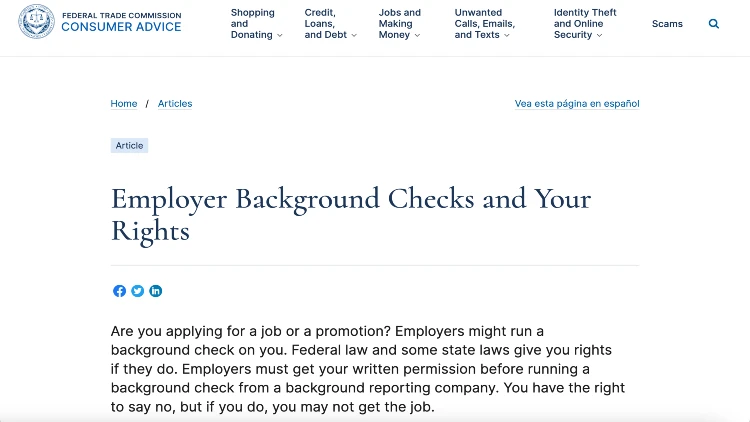
(Image: Federal Trade Commission8)
A company, by law, must do the following for an employee background check:
- Notify a job candidate, in writing, of a decision not to hire based on data in an employment background check.
- Provide the data that was used to make the decision in the screening and what agency reported the data including the name, address, and phone number to contact them.
- Provide data to the candidate that states a free copy of the background check can be obtained for at least 62 days.
- Inform the candidate that they can dispute the details found on a background check.
If you find that erroneous data in a screening caused you to miss out on a job opportunity or that inhibits your ability to purchase a home, for instance, you can also contact the agency that conducted the check and have them remove that data. Just know that it will be up to you to prove that it isn’t correct, so you’ll need to gather evidence to support your claim.
3 Most Common Background Check Errors
The most common background check errors can easily be rectified by contacting the agency that reported the error in a screening. You’ll realize that there are errors by requesting the background check data to view yourself.
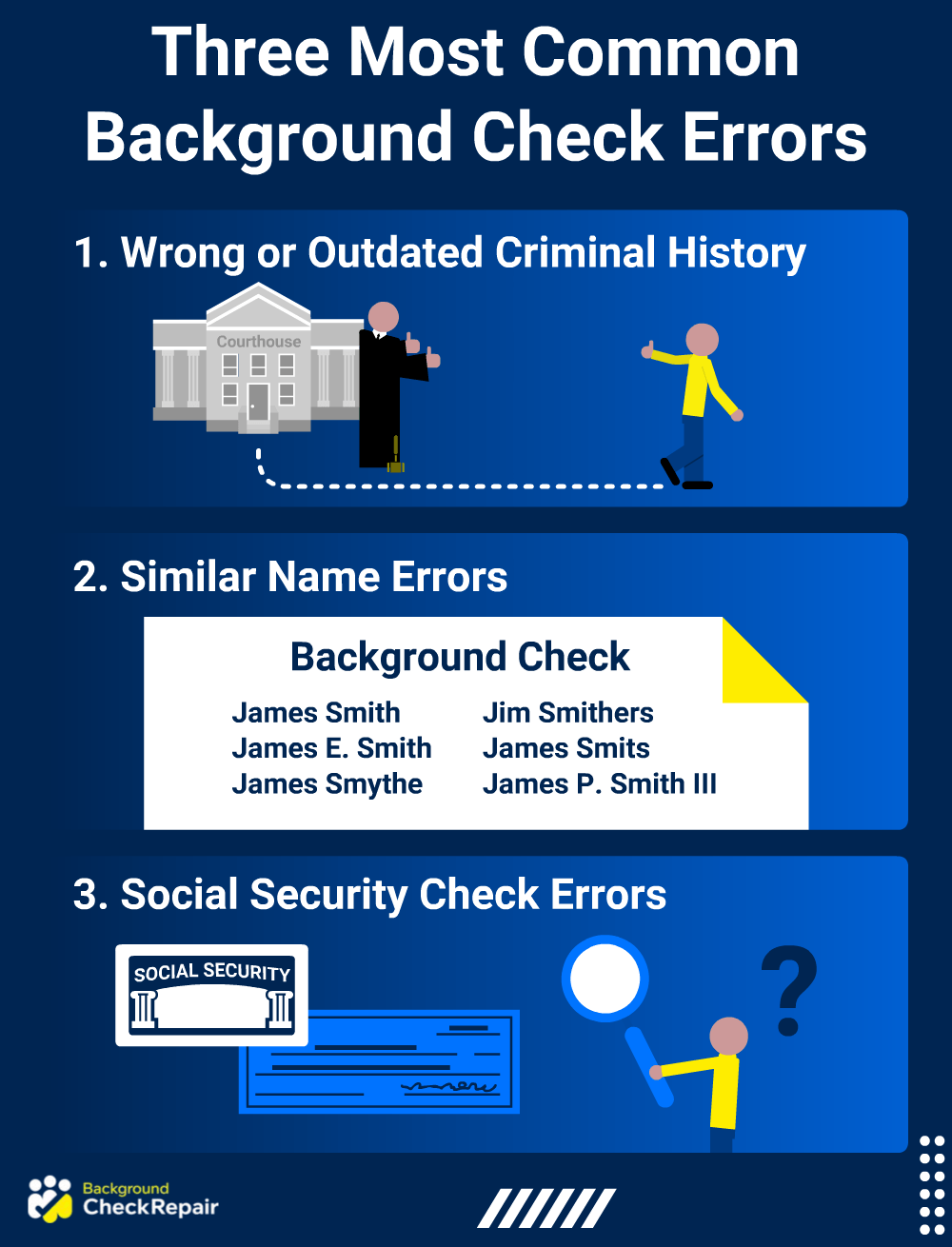
- Wrong or outdated criminal history on a candidate, including those that are expunged. The extent of background investigations depends on the state. Commonly, they go as far back as 5 to 10 years with seven being the most common. Can background checks dig up arrest records even if there was no conviction? Commonly, yes, but each state has its own laws, so check with your local jurisdiction.
- Similar name errors causing a mistaken identity.
- Social security check errors that cause mistaken identity.1
Do this now: if you’ve submitted a background check for employment, credit, or another purpose, and haven’t heard anything back for two weeks, ask your potential employer or lender if the results have been received and what was found. Both level one and level two background checks commonly take less than four business days to complete. They can take longer, but this is the industry average. The background check background process can be slow sometimes, so check with the person conducting the test for updates.2
Passed Check
If a background check is good, you’ll typically not be told directly. Instead, you’ll be approved for hire, accepted to turn in a rental application, or lent money to purchase a home. Essentially, the life decision you’re making isn’t impeded by your criminal past and background check.
Do this now: If you’re approved for a job or a loan, celebrate. To confirm that you passed your background check, you can ask the employer, bank, or agency that conducts the background check. There are many phishing methods used today to gain access to someone’s personal information, including cookies, and spyware. So always check to make sure that the data reported in your background inquiry is correct.
Employment Background Check Conditions
While a potential employer can ask questions about your background, they aren’t permitted to ask about:
- Medical data
- Genetic data including family medical history
In some cases, additional data is required for certain job positions. If you are applying to work with the elderly, children, or people with disabilities, then your background check may be more extensive and take longer. Medical background data can only be asked for under rare circumstances. The U.S. Equal Employment Opportunity Commission (EEOC) outlines how medical questions can be asked, usually surrounding a request for working accommodations.3
What Are Employers Looking for in My Background?
When asking, “How do I know if I passed my background check,” there are some things you can look for. Jobs with different responsibilities will dictate the type of information an employer is looking for, but there are a few bits of important data that employers are seeking:
- Name verification
- Social Security number verification (to determine that you are who you say you are)
- Educational background
- Residential history
- Consistency in work history
- Criminal activity
- Credit scoring
- Social media activity
- Overall character
Before continuing make sure to understand the differences between level one and level two background investigations (because this greatly determines what will appear on your background check report).
Employee Background Checks: Common Red Flags
There are common red flags for employers, recruiters, and HR professionals when conducting employment background checks or criminal background checks. A background check company is often used as a third party to conduct an employer background check, to comply with state and federal law.
- Gaps in employment or short-lived jobs. While everyone may need time off from working to care for a loved one, to have children or care for them, or due to an illness or family emergency, if you’re gone too long from employment, it can indicate to employers that someone is difficult to work with. The same is true if someone works for only brief stints in short-lived or contractual jobs as reported on their resume. Employers often see this as a red flag.
- Education embellishments. Many people stretch facts on their resumes. In fact, up to 85% of people lie or exaggerate on their resumes. Most background check findings can quickly establish a baseline of truth in someone’s educational accomplishments.
- Non-reporting of significant employment. If someone leaves out an employer in their job history, this can sometimes indicate a problem to future employers.
- Bad credit. Poor credit can indicate an inability to consistently pay bills or meet financial obligations on time. This can be of concern to employers hiring for financial industry jobs and isn’t something easily reported on a resume.
- Bad references. Most people can provide references that vouch for their character and ethics, but when references provide information that paints someone as unreliable, or dishonest, this can cause alarm in a potential employer.
- Social media activity. Any social media activity that indicates aggression or lack of character can be a flag, although some states do have laws preventing the use of social media opinions from disqualifying you from a position.
- Criminal history. If a job applicant has a criminal history, potential employers may be concerned about their ability to carry out a job duty. Criminal history is not always indicative of a bad employee, but it can be.4
Criminal Records: What Databases Are Used?
There are different databases used to check criminal history depending on what state you reside in, but there are four agencies commonly tapped for information in both a state and federal background check.
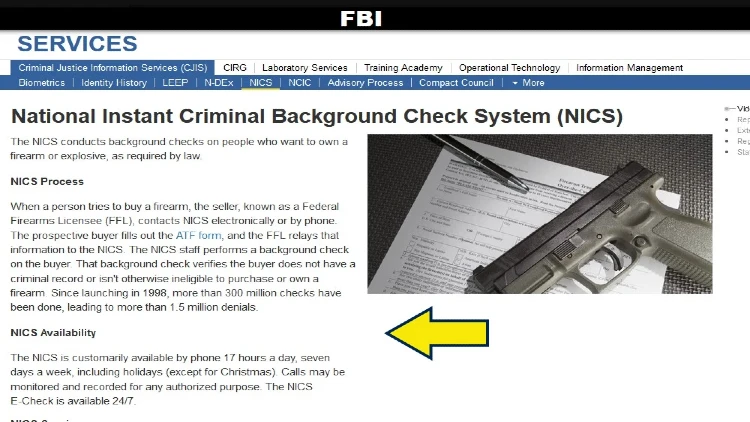
You can also interact with these databases to answer the question, ‘how do I know if I passed my background check?’
The FBI’s National Instant Criminal Check System (NICS)
Background checks often use NICS since it is a one-time check for firearm purchases which will turn up criminal history, legal alien status, military discharge information, mental health, and domestic abuse records. More than 1.5 million denials for firearms have been issued based on this information.
The FBI’s Criminal History Identification Database
Fingerprints obtained from arrests, federal employment, naturalization, or military service are used as the primary data in this database.
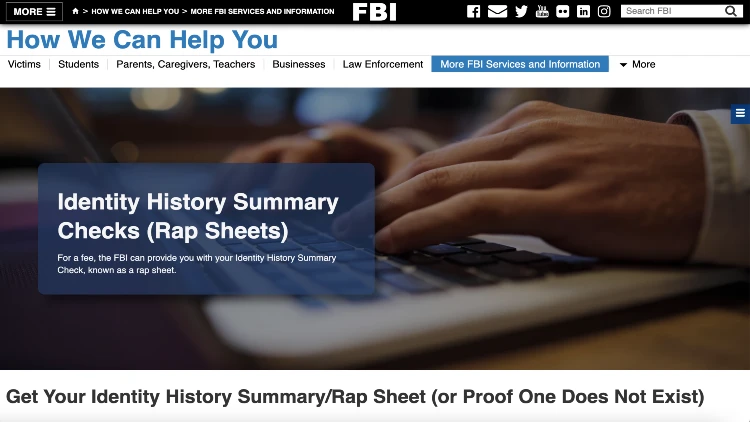
(Image: FBI9)
The US Attorney General suggests that the Identity History Summary Checks data system is not a comprehensive database and shouldn’t be relied upon as a pre-employment check, but it can be used in conjunction with other background check tools to gather information.
III or the Interstate Identification Index System
The National Crime Information Center (NCIC) keeps criminal record information through a national-state compact initiated in 1999 that allows criminal data to be shared across state borders. Records are shared for government licensing and background checks. It is not a comprehensive database, however, and should be used with other data whether it is a state or multi-state check.
State & Local Courts
Records from civil courts provide background check data about claims, lawsuits, and judgments filed against someone. Criminal court records provide information about criminal history. When criminal records are filed in state and local courts, they are often publicly available. A national background check often pulls information from several state and local records databases.5
Criminal Background Check
“How do I know when a criminal background check is being conducted in a regular background check?” is a question people often ask. To tell if a background check will inquire into criminal databases, you just need to know what level of background check is being conducted. Many times an employer won’t tell you, but you can assume that it is either a level one or level two inquiry as these are the most common.
If a job you are applying to deals with financial information, the job puts you into contact with children or the elderly, is a C-suite level position, or the employer deals with proprietary data and expects you to as well in the job, then you can rest assured that a higher level inquiry is being conducted, sometimes up to level 3 or 4.
When wondering ‘how can I know if I passed my background check,” you can inquire about a background check if you get turned down for a job, and you’ll often know what level was used after you’re either excluded from being hired for that job or you’re hired. However, employers don’t have to disclose what level of check they are using, just what data the employer finds after the inquiry is run.
Employment Background Checks
When an employer for a known job wants to conduct a background check for criminal data they must only go back for seven years in most states, including Kansas, Maryland, California, Massachusetts, New York, New Mexico, New Hampshire, and Washington.6
Criminal Background Checks (Criminal Record Info)
Criminal background check data can include criminal record data gleaned from civil suits and judgments, a driving record, arrest records, paid tax liens, misdemeanors, and felonies. In more detailed background checks social media, work experience detailed in past positions held, interviews with neighbors or co-workers, and past addresses may be used to help employers determine if someone is a viable candidate.
Employers cannot use details about criminal history that goes back more than seven years except in rare cases or as per specific state laws. Employers can go back more than seven years in certain cases7:
- In California, employers can’t use convictions relating to marijuana possession for more than 2 years from the disposition of the occurrence.
- In Maryland, employers hiring for the Transportation Networks are required to use the “entire adult history” for candidates.
- States like Alaska, Florida, California, Indiana, Massachusetts, Michigan, and New York offer exceptions for going past the seven-year mark when a career position pays a salary over $75,000, for example.
- Employers cannot use pending criminal cases in an inquiry in Kentucky.
- A failed background check in any state must instigate communication with the person the inquiry is conducted on, including help contacting the third party that conducts the inquiry.
A failed background check doesn’t mean you can’t get the job you want, the loan you need, or achieve another big milestone, especially if the information is erroneous and you take steps to correct it. There are free background check databases that the public has access to but these services are rarely instant, and may not contain comprehensive data.
The next time you’re wondering, “How do I know if I passed my background check?” if you’ll conduct a check on yourself first, you’ll know what agencies will see and whether or not you’ll pass, and can make necessary repairs.
References
1Crossner Legal. DEc. 4, 2021. How long does a background check take? (2021, September 10). Retrieved from <https://www.crosnerlegal.com/how-long-does-a-background-check-take/>
2Consumer law firm. Dec. 4, 2021. How to handle background check errors when a job is at stake. (2021, November 22). Retrieved from <https://www.consumerlawfirm.com/false-employment-reports/>
3EEOC. Dec. 4. 2021. Pre-employment inquiries and medical questions & examinations. (n.d.). Retrieved from <https://www.eeoc.gov/pre-employment-inquiries-and-medical-questions-examinations>
4Chane Solutions. Dec. 4, 2021. What percentage of candidates lie on resumes? (2020, May 27). Retrieved from <https://www.chanesolutions.com/2020/06/26/percentage-of-candidates-lie-on-resumes/>
5My Binc. Dec. 4. 20210. 4 criminal background check databases & why none are comprehensive. (2020, May 15). Retrieved from <https://mybinc.com/blog/what-databases-are-used-for-different-types-of-background-checks/>
6Checkr. Dec. 4. 2021. Security check. (n.d.). Retrieved from <https://help.checkr.com/hc/en-us/articles/360000739988-How-do-background-check-reporting-requirements-vary-by-state->
7Alliance Risk Group. Dec. 4, 2021. What is the 7-Year rule in background checks? (2021, June 16). Retrieved from <https://allianceriskgroup.com/what-is-the-7-year-rule-in-background-checks/>
8Federal Trade Commission. (2021, Nov 29). Employer Background Checks and Your Rights. Federal Trade Commission. From <https://consumer.ftc.gov/articles/employer-background-checks-your-rights>
9FBI. (2019). Federal Bureau of Investigation. Federal Bureau of Investigation. From <https://www.fbi.gov/>
